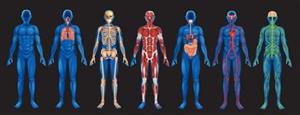-

Project Lead the Way; Biomedical Science - Curriculum
The rigorous and relevant four-course PLTW Biomedical Science sequence allows students to investigate the roles of biomedical professionals as they study the concepts of human medicine, physiology, genetics, microbiology, and public health. Students engage in activities like investigating the death of a fictional person and learning content in the context of real-world cases. They examine the structures and interactions of human body systems and explore the prevention, diagnosis, and treatment of disease, all while working collaboratively to understand and design solutions to the most pressing health challenges of today and the future.
Each course in the Biomedical Science sequence builds on the skills and knowledge students gain in the preceding courses. Schools offer the three PLTW Biomedical Science foundation courses within a period of three academic years from the start of implementation and may also offer the capstone course.
Foundation Courses
Principles of the Biomedical Sciences - (9th)
In the introductory course of the PLTW Biomedical Science program, students explore concepts of biology and medicine to determine the factors that led to the death of a fictional person. While investigating the case, students examine autopsy reports, investigate medical history, and explore medical treatments that might have prolonged the person’s life. The activities and projects introduce students to human physiology, basic biology, medicine, and research processes while allowing them to design their own experiments to solve problems.
Human Body Systems - (10th)
Students examine the interactions of human body systems as they explore identity, power, movement, protection, and homeostasis. Exploring science in action, students build organs and tissues on a skeletal Maniken®; use data acquisition software to monitor body functions such as muscle movement, reflex, and voluntary action, and respiration; and take on the roles of biomedical professionals to solve real-world medical cases.
Medical Interventions/Research Project - (11th)
Students follow the life of a fictitious family as they investigate how to prevent, diagnose, and treat disease. Students explore how to detect and fight infection; screen and evaluate the code in human DNA; evaluate cancer treatment options, and prevail when the organs of the body begin to fail. Through real-world cases, students are exposed to a range of interventions related to immunology, surgery, genetics, pharmacology, medical devices, and diagnostics. In addition, this course also requires students to work with a local university professor, medical doctor, or lab scientist, assisting them in research being conducted by this healthcare professional. As a result, each student will produce a high-caliber professional research paper or project pertaining to their research experience.
Capstone Course
Biomedical Innovation/ Senior Internship - (12th)
In the final course of the PLTW Biomedical Science sequence, students build on the knowledge and skills gained from previous courses to design innovative solutions for the most pressing health challenges of the 21st century. Students address topics ranging from public health and biomedical engineering to clinical medicine and physiology. Each student will be placed in an internship during the second semester of their senior year. Students will have the opportunity to work in an environment that is aligned with their future career goals. Students will independently design a project based on their internship experience with a mentor or advisor from a university, medical facility, or research institution and present their findings to their peers, CSMB staff, and university professors at a culminating end-of-the-year presentation.

Select a School...
Select a School
- Adams Elementary School
- AESM Middle School at LOuverture
- Alternative Education
- Ames Visual & Performing Arts Elementary
- Ashland Elementary School
- Back to School 2024-25
- Betty Wheeler Classical Junior Academy
- Bryan Hill Elementary School
- Buder Elementary School
- Busch Middle School of Character
- Carnahan STEAM
- Carr Lane VPA Middle School
- Central VPA High School
- Citywide Planning Committee
- Clyde C. Miller Career Academy High School
- Collegiate School of Medicine & Bioscience
- Columbia Elementary School
- Compton-Drew ILC Middle School
- Dewey IS Elementary School
- ETS at Madison
- Educators for Gun Safety
- Success Academy @ Sumner High School
- Froebel Literacy Academy Elementary School
- Gateway Michael Elementary School
- Gateway MST Elementary School
- Gateway MST Middle School
- Gateway STEM High School
- George Washington Carver Elementary Academy
- Hamilton Elementary School
- Herzog Elementary School
- Hickey Elementary School
- Hodgen Tech Academy
- Humboldt Academy of Higher Learning Elementary School
- Jefferson Elementary School
- Lexington Elementary School
- Literacy for the Lou
- Long International Middle School
- Lyon Academy at Blow PK-8
- Mallinckrodt Academy of Gifted Instruction
- Mann Elementary School
- Mason School of Academic & Cultural Literacy Elementary School
- McKinley CLA High School
- McKinley Classical Leadership Academy
- Meramec Elementary School
- Metro Academic and Classical High School
- Monroe Elementary School
- Mullanphy-Botanical Garden Elementary School
- Nahed Chapman New American Academy
- Nance Elementary School
- Nottingham CAJT High School
- Oak Hill Elementary School
- Pamoja Preparatory Academy at Cole
- Patrick Henry Downtown Academy
- Peabody Elementary School
- Laclede Junior Career Academy
- Proposition S Updates
- Roosevelt High School
- Shaw Visual and Performing Arts Elementary School
- Shenandoah Elementary School
- Sigel Elementary School
- SLPS Building Revitalization Collaborative
- Soldan International Studies High School
- Stix ECC Elementary School
- Sumner High School
- Work for Saint Louis Public Schools
- Vashon High School
- Walbridge STEAM Academy
- Washington Montessori Elementary School
- Wilkinson Early Childhood Center @ Roe Elementary School
- Woerner Elementary School
- Woodward Career Academy
- Yeatman-Liddell Preparatory Middle School

